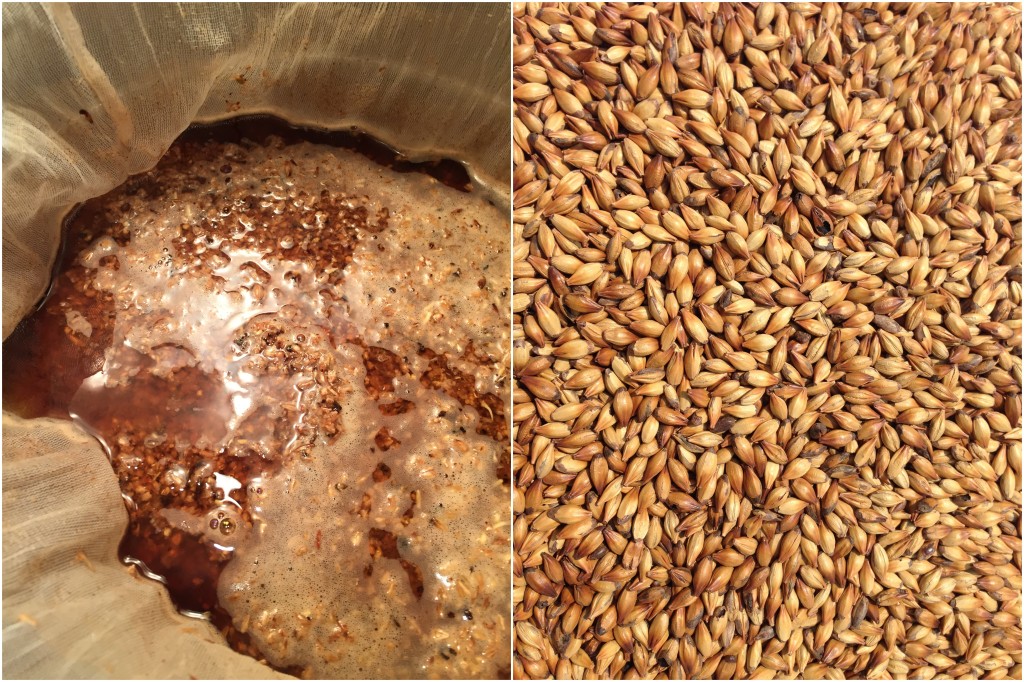Important Update
Initially, I was very happy with this mill, but I did end up having problems with the rollers. I have tried many adjustments but have a hard time getting the rollers to engage. For what I paid for it, I feel like it should have lasted much longer. My Barley Crusher continues to work after years and years and it cost much less. Others have commented on this review along those same lines. I like a lot of things about this mill, but would love to see them address the quality issues related to the rollers.
This post still has some very interesting crush and mash test results that make a great case for taking control of your brew day by crushing your own grain.
Check Current Pricing and Availability, Review, Crush & Mash Tests Continue Below:
Captain Crush Grain Mill for All Grain Home Brewing – Malt Crusher on Amazon
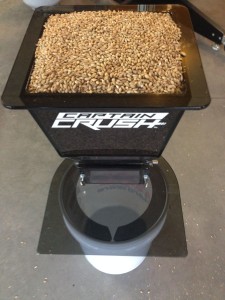
Here is a Hands on Review of Northern Brewer’s Captain Crush, 3 Roller Grain Mill. It includes thoughts about the mill, photos of the mill in action and a crush/mash trial.
More Mill Reviews!


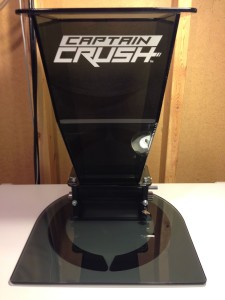 The Captain Crush Grain Mill
The Captain Crush Grain Mill

The box. It’s large.

Not only is it large, it’s heavy. My Ultraship 55 (usually my grain scale – Review) shows a whopping 21 lbs 7 ounces.
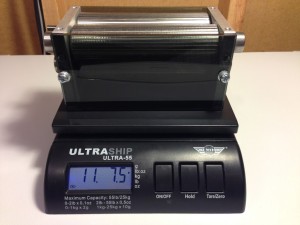
Over half of that weight is the roller mill assembly itself.

Top of the mill

Bottom of the mill

Base. The circular pieces in the middle are designed to fit nicely on a bucket.

Assembled. This mill is huge and it looks cool.
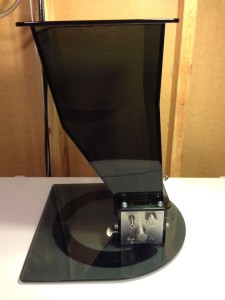
Profile view
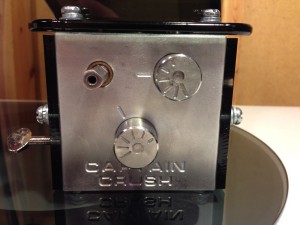
One of the nice things about the Captain Crush are the easy adjustment knobs. You can change settings quickly and without tools. The current setting is NB’s recommended “optimal setting”. Also notice the drill connection shaft toward the top left of the mill body.
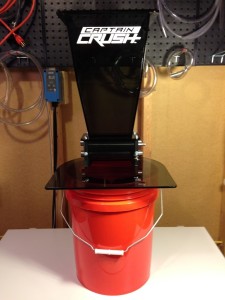
Installed on a bucket.
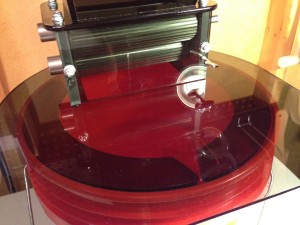
The base fits perfectly inside this 5 gallon bucket.
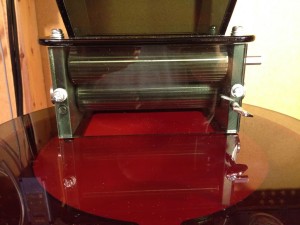
Front view
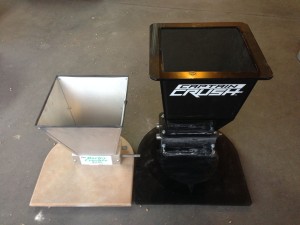
For size comparison side by side vs my Barley Crusher Grain Mill
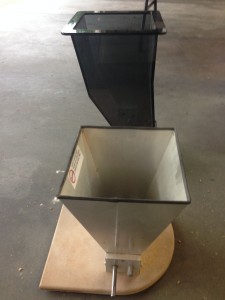
Profile view compared with the Barley Crusher. As you can see the Captain Crush Mill is considerably larger.
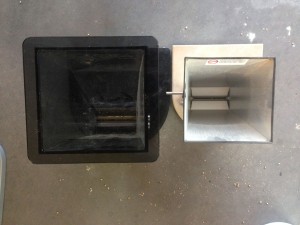
Top down view vs Barley Crusher
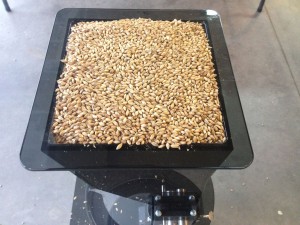
The official size of Captain Crush’s Hopper is 11 lbs. I’ve found that it can hold at least that much. This picture shows the vast majority of the malt bill for 1 Hour IPA – continuously hopped IPA. The malt bill for that is 13 lbs. The hopper is holding just under 12 lbs… 11 lbs 14 oz.

Front View
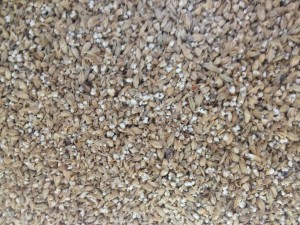
A picture of the crush
Mash Trials:
These are side by side mash tests using the Captain Crush Mill on “optimal” setting vs store crushed grain. The Rahr 2 Row both milled and unmilled were sourced at a reputable local homebrew shop. Note that it did not come from Northern Brewer. To produce as consistent results as possible, I measured everything (water and grain) in grams to the nearest single gram.
Procedure:
- Weigh 906 grams (1.997 lbs) of grain
- Weigh 2,715 grams of strike water (.717 gallons)
- Heat up strike water to 162 deg F. Overheat by a degree or so and then stir back down to temperature. It’s easier to hit a stable temp going down vs hitting it going up.
- While strike water is heating pre-heat mash tun with 1/2 gallon of 212 deg F water.
- Place grain (inside of bag) in cooler.
- Add strike water.
- Stir and record temperature.
- Mash for 60 minutes.
- Drain first runnings.
- Grain back in mash tun.
- Add 1,884 grams (.497 gallons) of 212 deg F water to the grain and stir. I normally would not sparge with boiling water. I used boiling water to take one more variable out of the equation.
- Drain second runnings. Let grain bag sit on strainer for 5 minutes.
- Record volume and gravity.
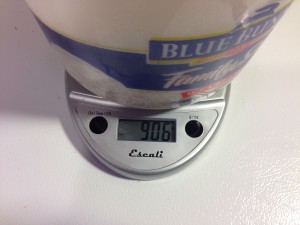
Each test used 906 grams (1.997 lbs) of grain
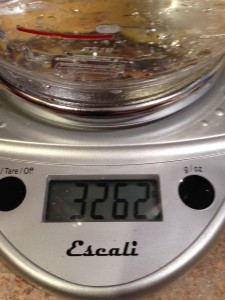
Each Test used 2,715 grams of strike water (.717 gallons). For some reason I didn’t use the tare feature when I weighed the water. The pitcher ways 547 grams. That makes the water 2,715 grams.
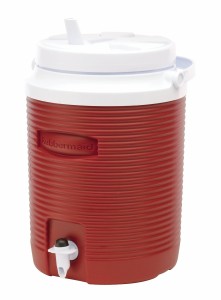
This 2 Gallon Rubbermaid Cooler Served as a Mash Tun. I used a paint straining bag to contain the grain. This process worked pretty well. This would be good equipment and technique to use for small batch all grain brews. For consistency, I pre-heated the cooler prior to placing grain and strike water into it.
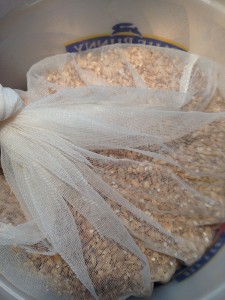
A 5 gallon paint straining bag contained the grain.
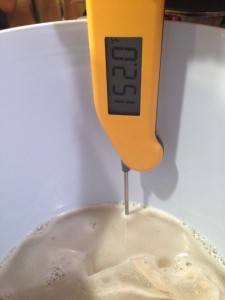
My Thermapen reading mash temperature. The temperatures of each trial mash were close but not identical. One read 151.5 deg F, the other read 152 deg F. I consider that to be within the limits of what I can test and produce in my kitchen.
Results Store Milled:
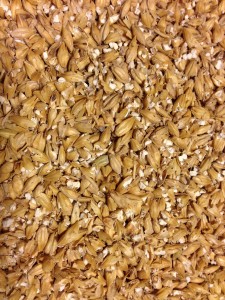
Store Milled Grain
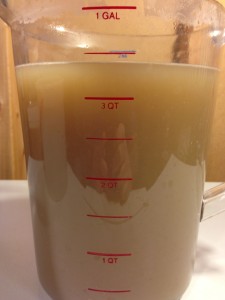
Collected Wort. With the help of an on-screen ruler, I’m going to estimate this at .859 gallons collected. That means that .355 gallons were absorbed. Making the absorption rate for this grain and crush .177 gallons/lb.

My Atago Pal-1 Digital Refractometer reads 10 Brix. That’s on OG of 1.040. Rahr 2 Row should provide 37 points per lb. That means there are a total of 74 points in the two lbs of grain I used. .859 gallons of 1.040 wort comes out to a total of 34.375 points or an efficiency of 46.4%. That’s low. Although, the point of this particular experiment is to compare two grinds, not to measure the efficiency of one technique vs another.
Results Captain Crush Milled:
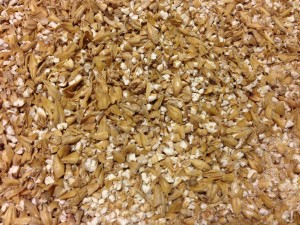
Milled Grain
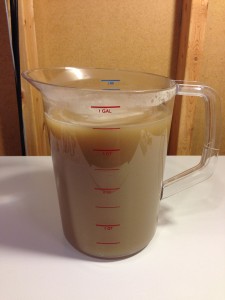
Collected Wort. I’m going to estimate this at .875 gallons collected. That means that .339 gallons were absorbed. Making the absorption rate for this grain and crush .170 gallons/lb.

My Atago Pal-1 Digital Refractometer reads 13.2 Brix. That’s on OG of 1.053. Rahr 2 Row should provide 37 points per lb. That means there are a total of 74 points in the two lbs of grain I used. .875 gallons of 1.053 wort comes out to a total of 46.375 points or an efficiency of 62.6%. Again, the point of this particular experiment is to compare two grinds, not to measure the effectiveness of a particular set of equipment or technique.
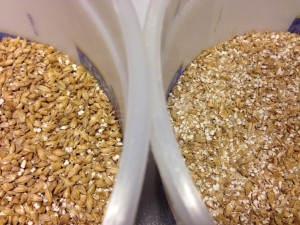
Store Milled Grain (left) vs Captain Crush Mill using “optimal” setting (right). Click to zoom.
Mash Test Conclusion:
- The store Milled Grain I used produced an efficiency of 46.4% vs an efficiency of 62.6% when using the “optimal” setting on the Captain Crush. That’s a comparative improvement of 34.9%.
- The Captain Crush’s “optimal setting” produces a great crush.
- Grain crush is a big part of efficiency. Store crushed grain can be on the under crushed side. Some stores do this to help prevent stuck sparges. That’s a valid strategy and it may be way you want.
- If you are looking for more control over your mash milling your own grain provides you with quite a bit more control. It also allows you to buy grain in bulk and crush right before brewing. That preserves freshness and leads to better tasting beer.
Conclusions
Initially, I was very happy with this mill, but I did end up having problems with the rollers. I have tried many adjustments but have a hard time getting the rollers to engage. For what I paid for it, I feel like it should have lasted much longer. My Barley Crusher continues to work after years and years and it cost much less. Others have commented on this review along those same lines. I like a lot of things about this mill, but would love to see them address the quality issues related to the rollers.
Check Current Pricing and Availability
Captain Crush Grain Mill for All Grain Home Brewing – Malt Crusher on Amazon
More Mill Reviews!

Get a Deal on Bulk Grain

A Deal on All Grain Kits
Adventures in Homebrewing discounts seasonal homebrew beer recipe kits by 20%. Selections include both all grain and extract options.
20% Off Seasonal All Grain Kits | 20% Off Seasonal Extract Kits
Grain Storage Options!
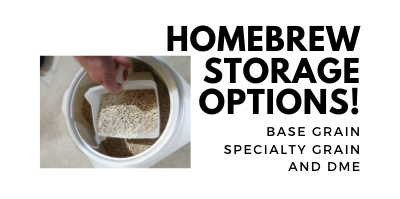
Everything All Grain!
Our resource post on all grain is the source for everything all grain!

More Homebrew Finds!
Special Thanks to Monster Brewing Hardware for providing the unit used for evaluation in this review.
pinned
This post may contain affiliate links. We may make a commission when you use our links. This will never cost you extra. Thank you for supporting Homebrew Finds!
greatdeals
adamztop5
Make sure the components you use are compatible and rated for your intended application. Contact manufacturer with questions about suitability or a specific application. Always read and follow manufacturer directions. review:captaincrushmill tag:tpr


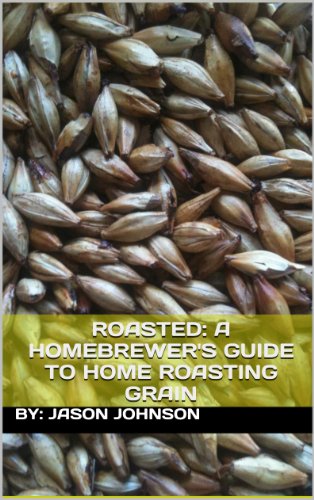
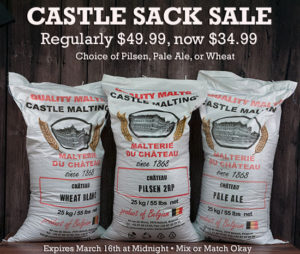




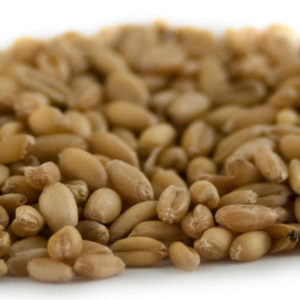
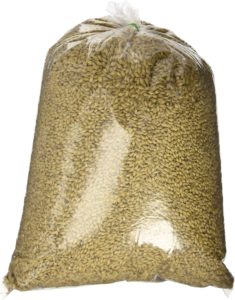



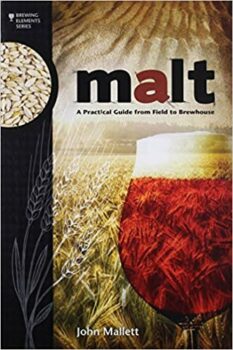









 The Captain Crush Grain Mill
The Captain Crush Grain Mill


































